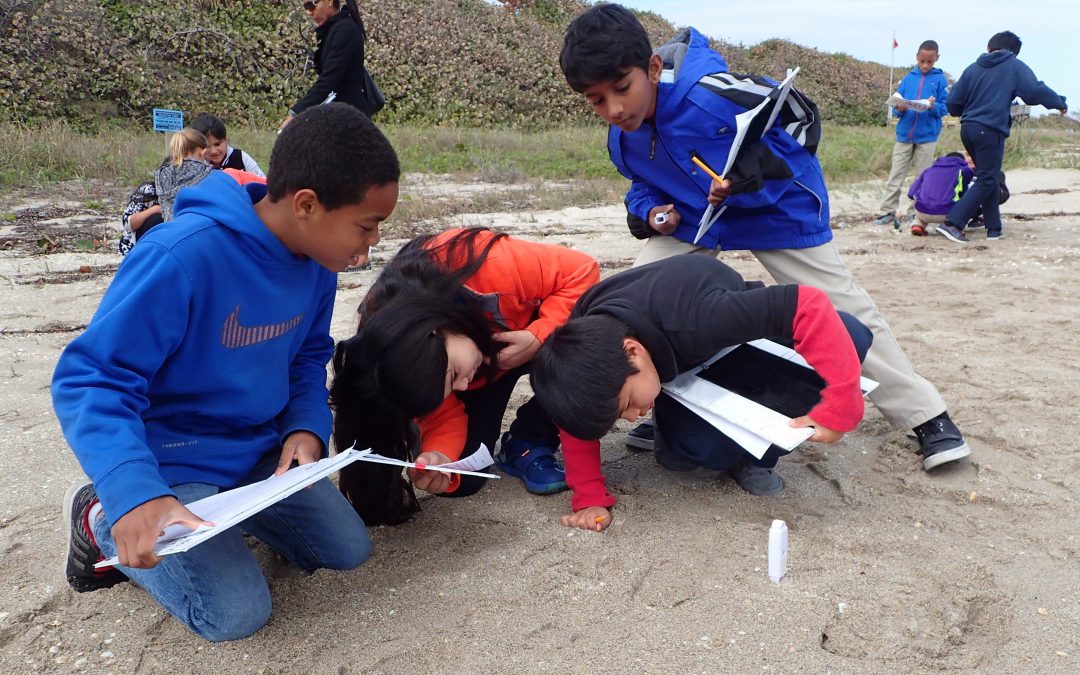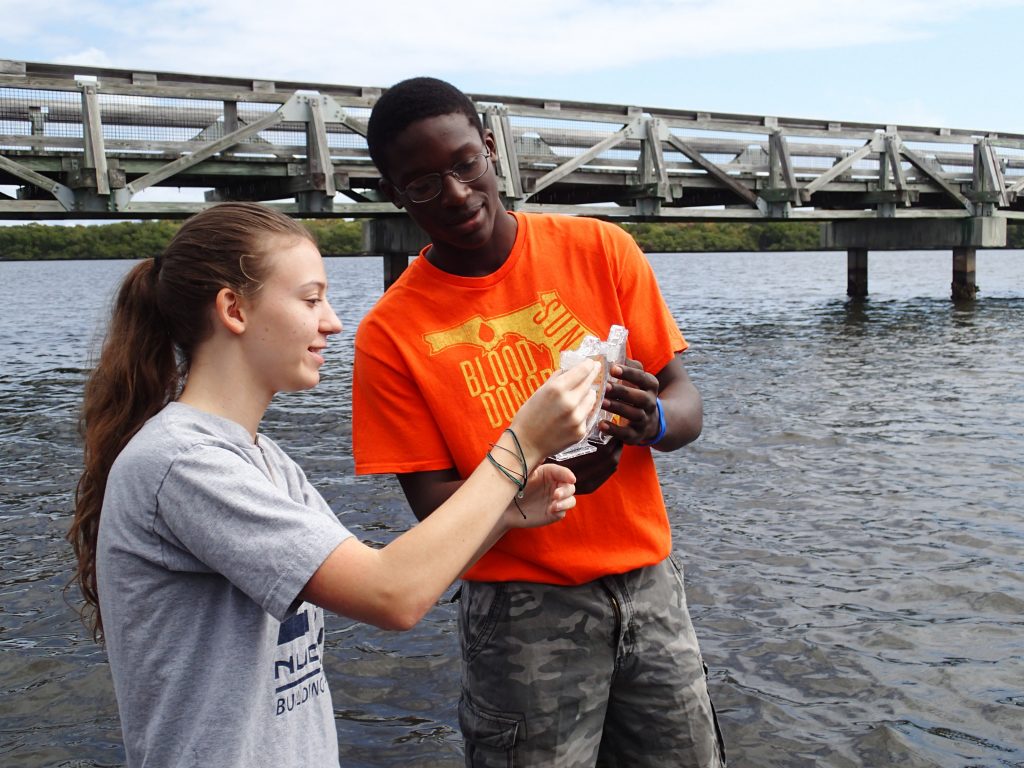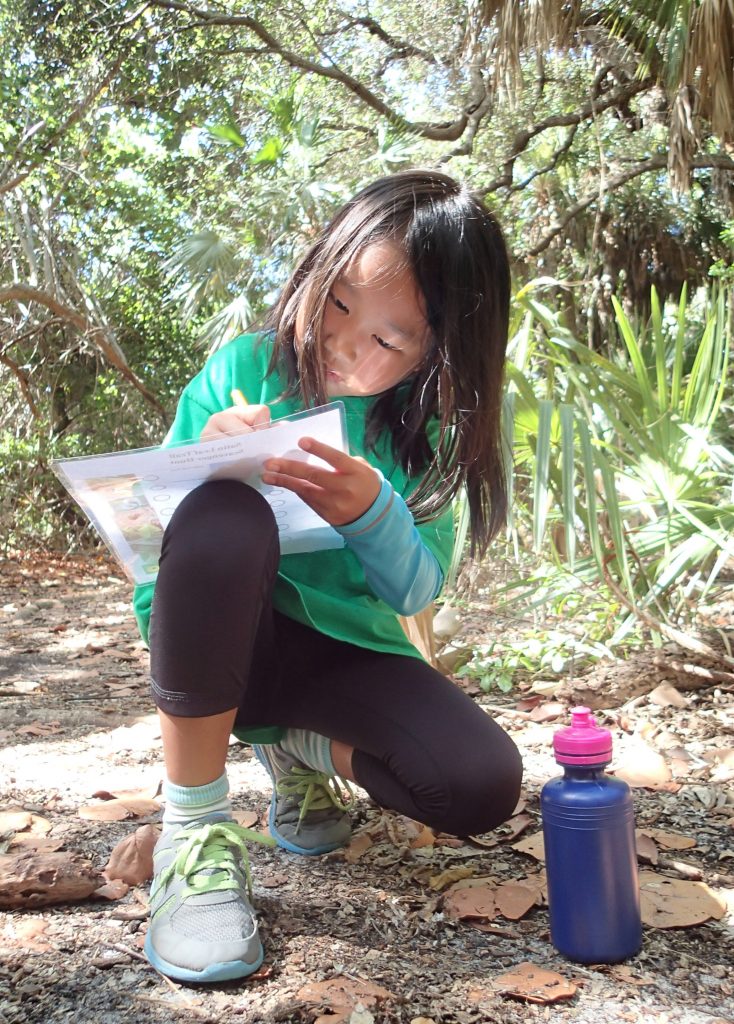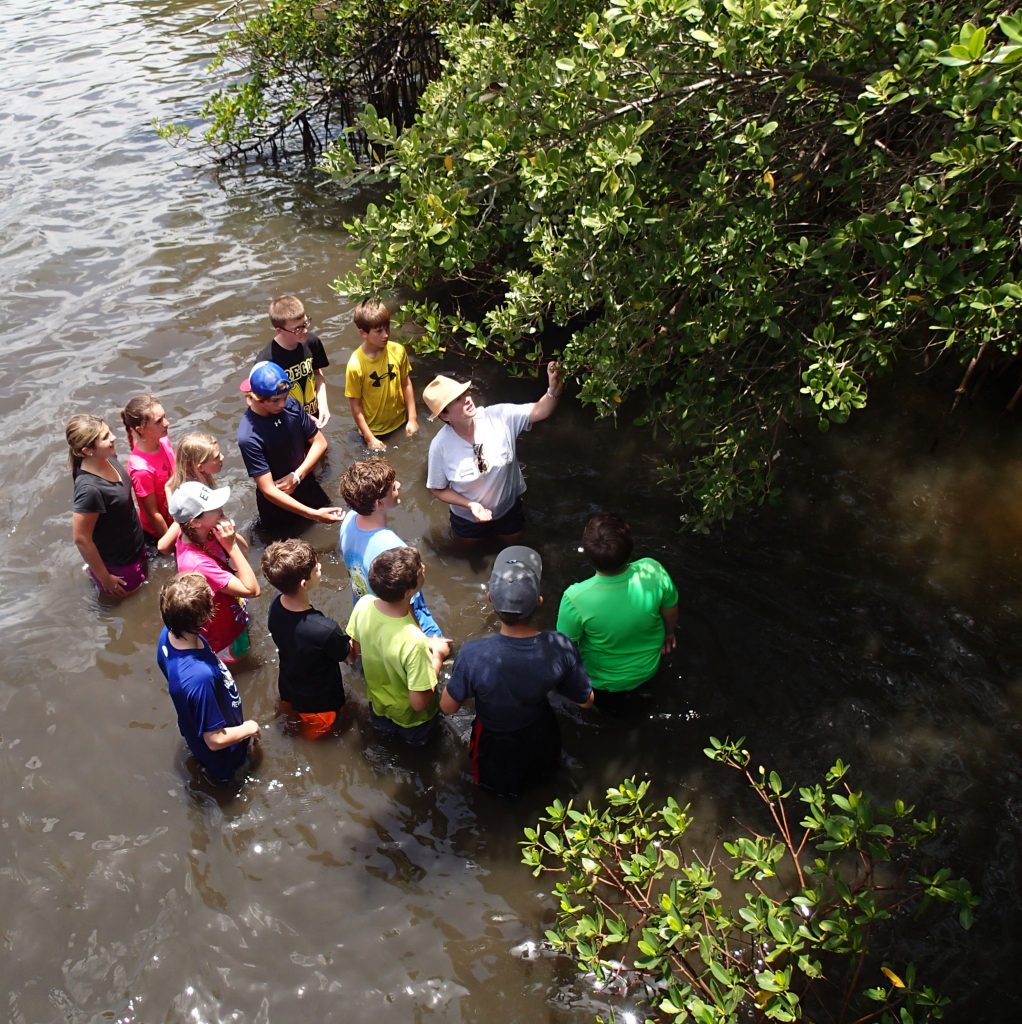By. Veronica Frehm
Friends of MacArthur Beach State Park (Friends) is a citizen support organization formed to support the only state park in Palm Beach County (PBC), Florida – John D. MacArthur Beach State Park (MacBeach). Friends realizes the importance of learning in the natural environment and the positive effects it can have on a child. That’s why, in 2001, Friends made a dedicated effort to support environmental education (EE) by launching the Natural Science Education Programs, a series of experiential, hands-on EE programs that are aligned to state standards and STEM connections. The programs are free for PBC students in first through twelfth grades and serve approximately 5,000 students a year.
The work of Friends with The School District of Palm Beach County (PBCSD) exemplifies the power of partnerships to help schools “green” their curriculum. Many of the schools that come for field experiences at MacBeach are working on sustainability and environmental initiatives. Most students who attend field experiences at MacBeach are from Title I schools, or schools with large concentrations of low-income students that receive supplemental funds to assist in meeting students’ educational goals. All students who participate in our programs learn through hands-on experiences how to be great environmental stewards, using MacBeach as a living laboratory.
Learning in the Field
MacBeach offers 14 different field experiences based on grade level and science concepts covered in the classroom. Teachers can choose from experiences such as:
- Bird Basics, which focuses on the adaptations of birds that live in the park.
- Estuary Explorations, where students wade into the estuary habitat and use seine nets to collect organisms which they later view through microscopes in the classroom.
- Habits and Habitats, where students explore the similarities and differences of flora and fauna found in three park habitats.
- Oceans 911, where students learn about marine debris; collect debris on the beach; analyze where it came from and how much there is; and create an action plan to tackle this global issue.
All field experiences follow a general pattern. Before arriving, students take a pre-test, view an introductory video that highlights the ecosystems and flora and fauna they will most likely encounter at the park, and complete a pre-lesson, which introduces the concepts they will learn about during their field experience. At the park, students become “scientists for the day.” They use scientific tools to carry out experiments and observe and record their findings on datasheets. Back in the classroom, students complete a post-activity and take a post-test to gauge overall learning.
Take our third-grade Plants Plus field experience as an example. Students take a pre-test before diving into the pre-lesson – reading a children’s literature book that introduces students to the wonder of plants. Students then complete a simple plant identification lesson and datasheet to assess their current knowledge on the subject. They then view the introductory video, which builds anticipation for their trip. Once students arrive at MacBeach, they go on a hike around the park to investigate the different plants found in our habitats. They collect data within our ecosystems’ plant categories and discuss the adaptations needed to survive in each habitat. Students then observe different plant parts under a microscope in our science laboratory at the end of their adventure. As they leave, we encourage them to keep thinking like a scientist and to come back to MacBeach with their families to share all they learned. Back at school, students conduct a schoolyard plant hike, comparing and contrasting our park habitats with those at their school. Finally, the post-test is administered to measure their learning gains.
Pre- and post-test data collected from 2016 to present indicate an average knowledge increase of 47%. Further data demonstrate that students who come to MacBeach achieve significant learning gains, improve their science scores for state testing, and strengthen their environmental stewardship ethics. A fifth-grade teacher whose class participates in the program stated, “I like to come to the park with my students for our field experience at the beginning of the year so I can tie in everything we learn throughout the rest of the academic year. Not only do my students walk away learning specific science concepts, but they absorb so much from being in the natural environment. The park is a perfect way to explain and demonstrate real-world examples that they need to learn about in the classroom.”
Many students are struck with awe when they enter MacBeach and see our habitats for the first time. Some of these students live less than five miles away, yet they’ve never seen the Atlantic Ocean or walked on a sandy beach. For example, when a group of high school students came to participate in the Oceans 911 experience, a 17-year-old student told me this was the first time he had seen the ocean and he couldn’t believe how big and beautiful it was. I noticed that he walked away from the group while we were collecting and sorting debris, so I approached him and saw he had tears in his eyes. He asked me how people could hurt something so beautiful. A few months later, I received a phone call from his teacher who told me that he started a school green club focused on reducing waste and recycling, all because of his time at MacBeach.
Virtual EE Programming
Another component of our partnership with PBCSD is our Virtual Field Trips program. Although they aren’t a substitute for experiential education, our virtual field trips have proven to be a great way to engage schools and students who cannot make it to MacBeach to learn in-person. Virtual field trips offer a live, interactive platform where students watch from their classrooms as our Director of Education and a Park Ranger give presentations on various ecological topics, like endangered plants and animals, adaptations of animals at MacBeach, and the beach dynamics of erosion, weathering, and deposition. At the end, students participate in a Q&A about the topic. We reach approximately 10,000 students annually through virtual field trips.
Due to COVID-19, we’ve shifted our in-person field experiences to a virtual platform. We’ve strived to create high-quality virtual field trips for students to take part in, whether in the classroom or at home. Teachers sign up for the programs and our Director of Education connects by video using Google Meet or Zoom. The format is similar to the in-person field experience and students still learn the same standards as they would if they visited MacBeach in-person. The experience starts live with our Director of Education and then utilizes pre-filmed and edited videos to lead students through the chosen program. Students fill out datasheets, adapted for the virtual field experience, and follow along while they watch the pre-filmed exploration. Then, the Director of Education reconnects with the group to wrap up the lesson and debrief with the students. These virtual field experiences have made it possible to reach many students at one time, as teachers can broadcast the experience to entire grade levels. The highest number of students we’ve reached with just one virtual field experience was 160 students. Our goal is to conduct a virtual field experience every day, with all 14 programs being offered.
EE in the Summer
Friends also supports summer learning by hosting camps throughout June, July, and August. These age-based camps focus on science, love of nature, the power of EE, and learning by immersion. Students spend a week snorkeling, kayaking, exploring the island’s sandspits and, depending on their age, completing scientific studies. Each year, campers complete activities that wouldn’t be out of place in a research laboratory: they conduct seagrass surveys and submit data to local scientists; they complete fish counts on the Anastasia rock reef and submit data to REEF.org; they conduct bird counts and biodiversity studies; use seine nets and learn about biodiversity in the estuary; and much more. One of our most popular programs is “Skyping with a Scientist,” where scientists from around the world answer campers’ questions about their job, their research, or what it’s like to be a scientist. This has been a huge success – having the opportunity for that personal interaction allows campers to visualize what a career in science could look like, opening up possibilities they likely hadn’t considered before.
Results from summer camp pre- and post-tests show participation has resulted in a significant (22.2%) positive attitude change toward science and an increased desire to care for the local environment, even for students who already possess high environmental awareness. Further, we have found that students who participate in our summer programs are more likely to be civically engaged, show interest in science-related careers, and become generally interested in future scientific endeavors. Parent comments back up the data – I’ve had parents tell me that our summer program changed their child’s career aspirations, opened their eyes to new possibilities, and helped them see what awesome opportunities are out there.
Lessons Learned
One lesson we’ve learned through our partnership with PBCSD is transportation funding is limited despite district support. PBCSD allocates a certain amount of free bus fares each year for all schools. Once this funding runs out, usually in October, teachers have to raise their own funds for field trips. As a solution, Friends started a special fundraising initiative to allocate transportation funding for all Title I students. The initiative includes private donations from individual donors and family foundation grants. Through this initiative, Friends ensures that no teacher has to cancel their field experience because they can’t raise enough money. We are determined to get students to the park, one way or another.
Another lesson we’ve learned over the years is students have a much more fulfilling experience when their teachers wholeheartedly commit to and buy into the program. Teachers need to feel confident and empowered to model best behaviors while in the field. Yet, many lack the confidence to take a group of students outside to learn. So, with district grant funding, we started a program called MacBeach Explorations, which provides a week of professional development for teachers. All day, for five days, these teachers live EE: they take part in Project Learning Tree, Project WILD, and Everglades Foundation workshops. They learn about our habitats, the watershed, sea turtle nests, and everything in-between. When they return to MacBeach during the school year with their students, they are the “experts” and impress students with their knowledge. They are able to use the skills they acquired during the workshop to better themselves as educators and feel more confident with their abilities when teaching outside. One teacher told me that this was “not like normal professional development…this was fun and actually educational. I learned so much during this week – it’s truly unbelievable. I didn’t know there was so much to learn – it really shows how much I didn’t know before coming to this workshop. I can’t wait to experience this with my class.”
Partnerships between schools, school districts, and nonformal education venues like MacBeach are critical to providing a well-rounded education to K-12 students. The experiences provided by MacBeach for PBC students perfectly emulate the immense power and capabilities of EE and place-based education. Not only do we teach students important environmental and scientific concepts, but through EE, we inspire and motivate future generations to respect our planet and conserve its resources for many years to come. It’s one of the most important things we can do, because if they don’t know, they won’t care. If they don’t care, they won’t take action in the future to protect our world and the living things that depend on it.
Author Bio
Veronica Frehm is Executive Director of Friends of MacArthur Beach State Park. Veronica has worked in the environmental education (EE) and nonprofit fields for 14 years at various EE centers, nature centers, and residential camp settings. She is a published author with a recent article in Florida Scientist and has presented at local and national conferences, highlighting her award-winning work at MacBeach along with other education initiatives she has coordinated, including curriculum development with the Everglades Foundation.





